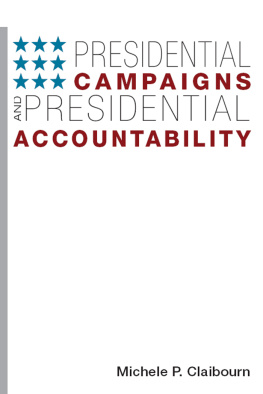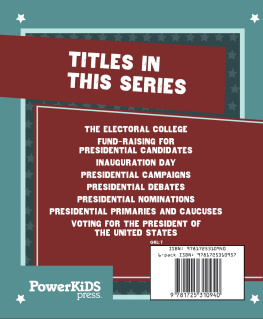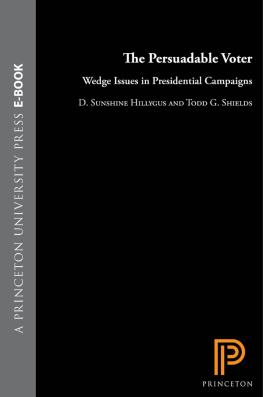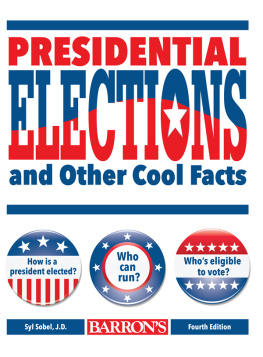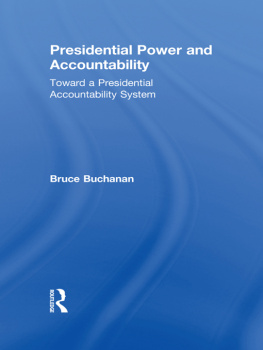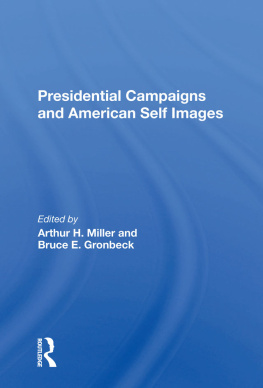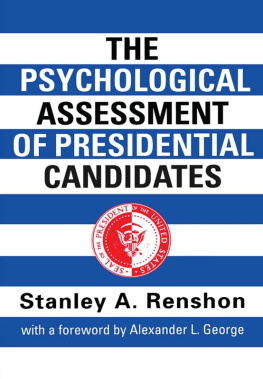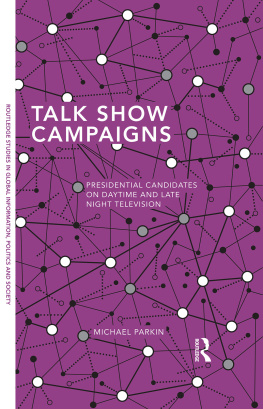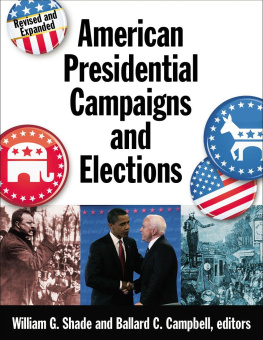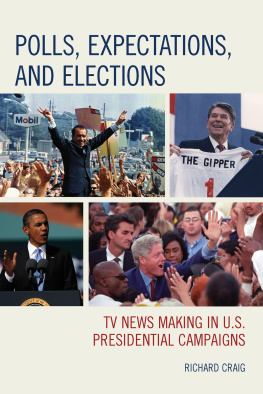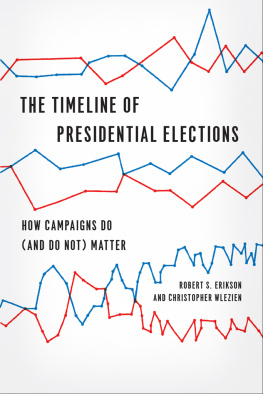PRESIDENTIAL CAMPAIGNS AND
PRESIDENTIAL ACCOUNTABILITY
DEMOCRACY, FREE ENTERPRISE,
AND THE RULE OF LAW
This series is devoted to the study
of democracy throughout the world,
of institutions that sustain and extend it,
and of forces that perpetually challenge
and endanger it.
Series Editor
Peter F. Nardulli, University of Illinois
Editorial Board
James Alt, Harvard University
Robert Bates, Harvard University
Henry Brady, University of California, Berkeley
Pradeep Chhibber, University of California, Berkeley
David Collier, University of California, Berkeley
John Freeman, University of Minnesota
G. Bingham Powell, University of Rochester
Beth Simmons, Harvard University
Paul Sniderman, Stanford University
MICHELE P. CLAIBOURN
Presidential
Campaigns
and Presidential
Accountability
UNIVERSITY OF ILLINOIS PRESS
URBANA, CHICAGO, AND SPRINGFIELD
2011 by the Board of Trustees
of the University of Illinois
All rights reserved
Manufactured in the United States of America
1 2 3 4 5 c p 5 4 3 2 1

This book is printed on acid-free paper.
Library of Congress Cataloging-in-Publication Data
Claibourn, Michele P., 1971
Presidential campaigns and presidential accountability /
Michele P. Claibourn.
p. cm.
Includes bibliographical references and index.
ISBN -13: 978-0-252-03592-0 (hardcover : alk. paper)
ISBN -10: 0-252-03592-5 (hardcover : alk. paper)
ISBN -13: 978-0-252-07789-0 (pbk. : alk. paper)
ISBN -10: 0-252-07789-X (pbk. : alk. paper)
1. Political campaignsUnited States.
2. Presidential candidatesUnited States.
3. Government accountabilityUnited States. I. Title.
JK 2281.C58 2011
324.70973dc22 2010040215
Contents
7. Beyond the Voting Booth: Clinton 1993
and Obama 2009
Illustrations
FIGURES
1.1 First-Year Presidential Approval: Clinton, Bush,
and Obama
4.3 Impact of Campaign Advertising Emphasis
on Hearing Bush
4.4 Impact of Campaign Advertising Emphasis
on Hearing Gore
TABLES
Acknowledgments
In the broadest sense, this book is about our ideas of democracy, ideas that have power over us as citizens, scholars, commentators, and leaders. Like all works, this one builds on the insights of generations of thinkers. I hope it honors these contributions by encouraging a more inclusive democracy. Like all empirical accounts, this one is far from definitive. My aim is to contribute to a useful conversation, to spark new questions about the links between our governors and those they govern, and the role of campaigns in creating these links.
This research was aided by multiple sources. I wish to acknowledge the support of the National Science Foundation through a dissertation improvement grant for helping to fund the 2000 election survey. The University of Wisconsin Survey Center provided in-kind support through countless hours of survey time as well. While writing this book, I was also fortunate to receive sabbatical support from the University of Virginia. The Miller Center of Public Affairs at the University of Virginia graciously provided a quiet place to work and an environment particularly conducive to thinking about presidents and our expectations of the presidency.
This work was improved immeasurably by the feedback of multiple colleagues. I would like to thank Paul Martin, David Klein, David Leb-lang, Paul Freedman, Chuck Jones, John Geer, Jamie Druckman, and several thoughtful reviewers for their suggestions on parts or all of the manuscript. In addition, the seed of this book was planted while writing my dissertation, and I wish to thank Charles Franklin, Gina Sapiro, and John Coleman for, many years ago, pushing me to think more broadly about the interaction of citizens and democratic institutions.
My family has been invaluable in the completion of the manuscript. My mother, Joy, has been a tireless supporter. My partner, Paul Martin, a man of countless talents, has been an inestimable colleague, an honest editor, and the man who brings me treats. I could not have written this book without his patient listening, his careful reading of drafts, and his endless encouragement. And to Winifred, whose boundless joy and curiosity, combined with a three-year-olds impatience with this project, has helped me keep things in perspective, I dedicate this effort.
Introduction
CAMPAIGNING FOR ACCOUNTABILITY
We made a series of what we felt were key statements on the American system, but Im not sure how many really sank into the electorate. We couldnt tell if any made a difference. Thats one reason why LBJ didnt feel particularly bound to follow through on everything. If we had been sure that an issue had been important, however, you can be sure of our reaction.
Aide to Lyndon Johnson (quoted in Light 1999)
Presidential election campaigns, and the electorate at which they are aimed, routinely come under fire from scholars, journalists, and pundits alike. Political analysts push candidates to clarify their policy differences. Scholars criticize campaigns for containing too little issue substance and specificity. And both shake their heads solemnly at voters who cannot correctly identify the policy positions of the candidates. Reading the critics, the presidential campaign hardly sounds like a successful process for choosing leaders, much less an effective link in democratic accountability.
In fact, presidential candidates are generally clear on at least one thingtheir lists of problems and priorities. The public cares about these priorities and uses them in evaluating the contenders. Whats more, in the long and repetitive campaign, citizens come to associate the candidates with their respective agenda priorities. The campaign establishes expectations about where a president will exert his effort once in office. Adherence to, or neglect of, these expectations goes some way in explaining presidential approval. And withdrawal of approval serves as an informal sanction against presidents who ignore the problems they campaigned on.
The fortunes of our most recent presidents early in their administrations serve as a useful illustration. Figure I.1 makes clear the very different patterns in the presidential approval of Bill Clinton, George W. Bush, and Barack Obama in the first year of each presidency.
President Bill Clinton began well enough, with approval rates in the mid-50s. The trend line for Clintons ratings, though, falls below 50 percent in mid-April 1993 and doesnt reach this midpoint again until early December 1993. Clintons early tenure was rife with agenda distraction (gays in the military), agenda revision (concern for the economy shifted from unemployment and the fairness of the tax burden to the budget deficit and the response of the bond market), and agenda delay (health care, a signature priority, was put off until late October).
President George W. Bush, too, begins with approval ratings in the mid-50s. For Bush, though, the trend line in this early period never falls below 52 percent. While upticks and downturns are visible in Bushs pre9/11 approval, they are modest compared to those for Clinton. Unquestionably Bush turned out to be a controversial president, but most of the controversy arose after the agenda-changing terrorist attacks. In the first eight months of office, he spent a great deal of energy on two of his campaign priorities, education and tax cuts, securing legislative victories on both before the years end.
 This book is printed on acid-free paper.
This book is printed on acid-free paper.
